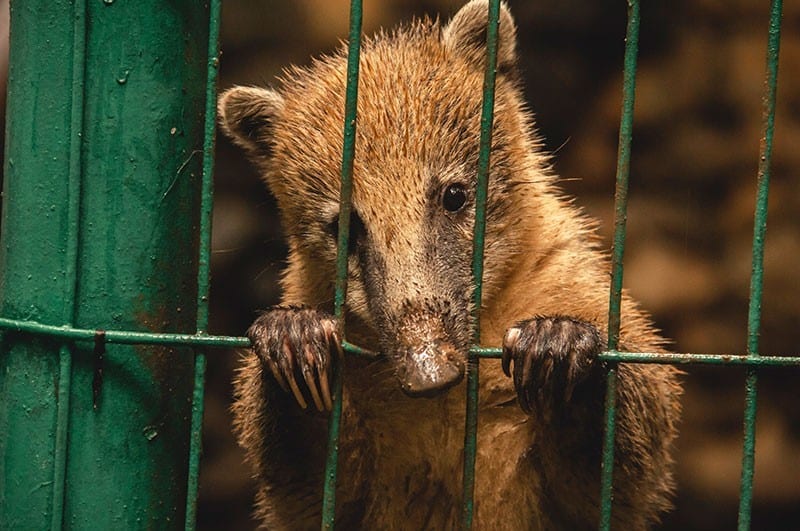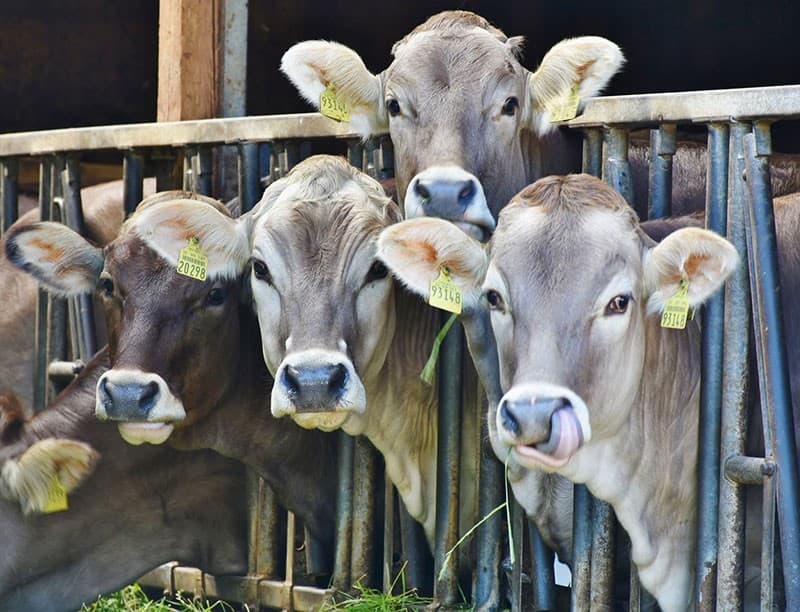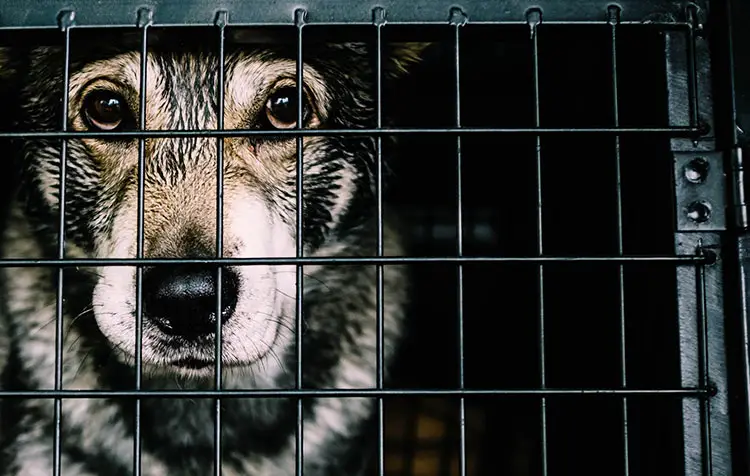Have you also just wondered if animals feel emotions like pain or fear and if animals can be emotional? Very good! Then you are probably also a person who questions things and shows feelings yourself. And of course the answer is YES! But to me it is just especially important that none of us sees animals as things. Whether in the stable, on the street, in the wild, as our own pet or as meat on our own plate.
In this article I would like to prove to you that animals are emotional beings that feel emotions like fears and pain just like we humans do. Finally, you will see a video that made me howl like a castle dog.
Tip: Do you know the Environmental problem of species extinction? This is one of many man-made Environmental problems of our time. Read the two linked articles to learn more.
Animals are not things, but sentient beings

In our hectic everyday lives, it can sometimes be forgotten that the kebab at lunchtime was once a sheep or lamb, a chicken, a cow or a calf. We need to understand that animals are emotional creatures that naturally feel emotions such as fear and pain. Respect and appreciation are the values that often fall by the wayside. Cows, chickens, dogs, cats, elephants, lions? All animals have feelings. There are no exceptions! How can you recognize that? Here are a few examples - animals...
- … flee (e.g. fish in front of the shark or fishing net)
- … play dead (e.g. rats, if they are in danger)
- … attack (e.g. bees when you hit them)
- … warn each other (e.g., flocking birds such as starlings when they sense danger).
- … search one after the other (e.g. mother cows call for their calf).
- … mourn (e.g. elephants, when an animal has died).
- … are pleased (e.g. dogs when reaching for the game ball).
- … remember (e.g. monkeys seeing a keeper again after a long time).
- …
Tip: Animals have emotions, but can Animals also cry emotionally? Read the linked article to find out.
Why do animals feel emotions and feelings?
Emotions help people and animals as well, evaluate certain situations and experiences. Feeling emotions therefore also provides a evolutionary advantage. Is there danger? Fear, for example, makes us more likely to avoid something. Is it fun? Feeling happy contributes to our longing for a repeat performance. And so on. Whether we're already feeling anticipation for the next episode of our new favorite show - or whether your dog is already looking forward to tomorrow's walk. Humans and animals tick in the same way. We must be clear to everyone.
It is the typical human vanity and impertinence of man to call an animal stupid just because his human mind is not sufficient to understand it.
Mark Twain
Those who own a pet usually know that animals can show feelings and feel emotions. That is why we are upset that there are people who eat dogs or cats. Cows, pigs and chickens are not typical pets, so it is easier for us to eat them.
But in principle, all animals and humans are equal. Whether cow, dog, pig, cat, parrot or chicken. What remains is the question: Why do we value some animals differently than others? The answer is probably our habits. And we have to break out of them if we no longer want animals to die for our taste buds or because of cultural traditions.
Notice: Feelings are different from emotions. While Feelings from within arise are Emotions always reactions which are triggered by own perception or thoughts.
Animals have feelings - what we do and should do

We humans are well aware that animals have feelings and allow emotions. Nevertheless, we behave anything but human. Here I would like to show you some examples of human actions and what each of us can do in everyday life for the welfare of animals.
Human crimes against animals
There are so many things that can be put in the category of "human crimes against animals" that I cannot even list them all here. But to understand what we do to creatures that mean us no harm, here are some examples that make us doubt our sanity:
- Factory farming: In Germany alone, around 745 million animals die each year.₁
- Chick Shredding: In Germany alone, approximately 45 million male chicks gassed.₃
- Whale battles in the Faroe Islands: Whales faithfully follow the suffering animal and do not leave the side of injured animals. On the Faroe Islands, this is their undoing, because whale slaughter is celebrated there like a folk festival.₄
- Ortholan food in France: In France, ortholans are considered a delicacy. Bizarrely, they are locked in a dark room for 2 weeks with their heads bandaged. And almost starved to death, they are then drowned in wine, which is supposed to taste particularly good as a result.₅
- Yulin Dog Meat Festival: At the Chinese festival, 10,000 dogs are consumed. All year round in China even 10 - 20 million dogs are eaten.₆
- Animals for laboratory experiments: In Germany alone, about 740,000 animals were killed in laboratory experiments in 2017. A total of 2.8 million animals were used. These included monkeys, cats, fish, dogs, mice and rats.₇
- …
These are crimes. And no matter what is claimed, these acts are not morally defensible. There is no good way to do such bad things.
Do you have other examples of human crimes against animals? Then feel free to post a comment.
This is what you can do for animals every day
Many know that animals have feelings and can be emotional. Yet they often indirectly and unconsciously cause animal suffering. Here are some things you can implement in your everyday life to save animals from emotional or physical suffering:
- No more eating meat: The renunciation of meat or its gradual reduction counteracts the climate change, the Deforestation and also the species extinction against. At the same time, animals are saved from unnecessary agony and emotional stress. More at Become a vegetarian.
- Become vegan: Another step is to give up any animal products. For example, replace cow's milk with oat milk. More under start into the vegan diet.
- Reduce food waste: 45 million chickens, 4 million pigs and 200,000 cattle die in Germany every year for nothing because we throw away food.₈ More at Reduce food waste.
- Do without palm oil: For Palm oil becomes rainforest destroyed. And unfortunately, it's in many everyday products. Use the CodeCheck Appto track down corresponding articles.
- Injured Help animals: For example, if you see an injured squirrel or a flightless bird, report it to your local animal control agency.
- Do without fur: Do not buy clothes made of animal material. For example, do without Fur with your winter coat.
- No souvenirs: Never buy souvenirs made of ivory or rare horn. This is an important stock of the sustainable travel. You can learn more about this under sustainable souvenirs.
- …
Tip: Just look around a bit in the Blog for Sustainable Living around. There you can find information about animal welfare and more generally about sustainability in everyday life. The inspiring Animal welfare quotes an added value for you!
Donations to animal welfare organizations
And of course you can also Support animal welfare organizations financially. Here are highly recommended places to go:
- PETA: For example, the organization advocates that animals no longer be used for food, clothing, entertainment or Animal testing used or exploited. Click here for the website.
- FOUR PAWS: The foundation fights to save animals in need and initiates educational campaigns for more conscious consumption. Click here for the website.
- Sea Shepherd e.V.: The association is primarily committed to the preservation of marine ecosystems. Click here for the website.
- Deutscher Tierschutzbund e.V.: The association fights for species-appropriate husbandry of animals and organizes, for example, educational lectures. Click here for the website.
Do animals have emotions, feelings and sense of pain? Yes!
Animals are sentient, emotional creatures. Everyone must understand that. But unfortunately not everyone answers the initial question with YES. Every animal stirs up fears, fears pain, feels joy and shows compassion. We know that. That we can still do something as cruel as Chick ShreddingThe way we practice whale slaughter, tail and beak clipping, live skinning, and even hunting for the horns of endangered animals will make future generations look upon us with disgust.
As long as we humans that animals do not feel, animals must feel that humans do not think.
Unknown
We must define the relationship between humans and animals in a contemporary way. Animals must not be treated like objects by us. Not by producers in meat production, not by us as consumers at the lunch table, and of course not by us as pet owners.
Do you have any questions about the article or suggestions you'd like to share? Then feel free to write a comment below this post. And if you like, feel free to share this post with others.
Stay sustainable,

PS.: In the Articles about sustainable living you get lots of tips for more Environmental awareness in your everyday life. Also look with pleasure in the Wildlife Blog Germany by. My brother Stephan shows emotional short films about Germany's wild animals there.
References:
₁,₂ Albert Schweitzer Foundation: factory farming. https://albert-schweitzer-stiftung.de/massentierhaltung. [08.10.2019].
₃ Süddeutsche Zeitung GmbH (2019): The slaughter continues (as at: 03/29/2019). https://www.sueddeutsche.de/wirtschaft/kuekenschreddern-das-gemetzel-geht-weiter-1.3924618. [08 OCT. 2019].
₄ Zeitungsverlag Neue Westfälische GmbH & Co. KG (2018): Bloody hunt: inhabitants of the Faroe Islands kill hundreds of whales (as of 20.08.2018). https://www.nw.de/blogs/tiere_und_natur/22221672_Blutige-Jagd-Bewohner-der-Faeroeer-Inseln-toeten-hunderte-Wale.html. [08.10.2019].
₅ NABU - Naturschutzbund Deutschland e.V.: Is the Ortolan flying off the menu?. https://www.nabu.de/news/2017/09/23197.html. [08.10.2019].
₆ Human Environment Animal Welfare Party (2019): Dog slaughter festival Yulin admonishes (as of: 02.07.2019). https://www.tierschutzpartei.de/hunde-schlachtfest-yulin-mahnt. [08.10.2019].
₇ DER SPIEGEL GmbH & Co. KG (2018): (Statistics on animal experiments 2017 (as of 20.12.2018). https://www.spiegel.de/wissenschaft/mensch/tierversuche-2017-2-8-millionen-versuchstiere-wurden-verwendet-a-1244739.html. [08.10.2019].
₈ Westdeutscher Rundfunk Cologne: Tons of food in the trash? Vomit! https://www1.wdr.de/verbraucher/ernaehrung/rewind-lebensmittelverschwendung-100.html. [07.10.2019].






Dear Christoph,
I have read this article with interest. In many respects I agree with you; I would also like to avoid any unnecessary suffering for people and animals. I also think that everyone should live consciously and do what they can within their means. And I also try to do that.
But this:
"Animals are sentient, emotional creatures. Everyone must understand that. But unfortunately not everyone answers the initial question with YES. Every animal stirs up fears, fears pain, feels joy and shows compassion. We know that. That we nevertheless practice something as cruel as chick shredding, whale slaughter, tail and beak clipping, live skinning, or even hunting for the horns of endangered animals will make future generations look upon us with disgust."
is simply not true. First of all, what is this "WE"? I have never done all the things described, nor do I advocate that anyone should do them. Shall future generations look at me with disgust? But probably not on you, although you write "WE", thanks to this web page. Are you still well???
On topic. MOST animals do not know empathy; this is a rarely observed phenomenon of higher mammal species like whales, apes and elephants. Even for animals emotionally close to us like pigs, cattle, horses, dogs, cats, all birds (including extremely intelligent species like crow birds and some parrots) such is unlikely or demonstrably absent. The care instinct may seem similar in humanized terms, but should not be confused with it,
EVERY ANIMAL fears pain and feels pleasure? Certainly not. Also this applies probably only to highly developed animals. Surely every animate being has some reward system and a self-preservation instinct, but does that deserve the same respect and consideration as the emotions mentioned? I think not.
Even fish - after all, specially protected as vertebrates - are so primitive according to the current state of knowledge that any such attribution is ridiculous. And all invertebrates, perhaps with the exception of octopuses and squid, but especially insects, are actually so callous that they could also be classified as bio-robots. There is nothing of feeling, joy, fear of pain or even compassion, merely primitive instincts.
What I want to say: we absolutely have to make gradations. Insects as food, for example, I find a very interesting way, even if I personally am still subject to the exclusively European food taboo (everywhere else they were and are eaten). But if a mealworm is now to be attributed the same "feelings" as a pig or cattle, it is really tight.... In your opinion, are there actually indications that e.g. insects feel like "all animals" according to your statement?
Especially since plants also feel attacks, defend themselves, communicate with their environment. Where does it stop then? Even caries bacteria want to live, I'm sure. I kill presumably a few million or billions of them every day.
And even viruses, which are actually not life at all, at least according to the current view, seem to be eager to have offspring. Do we - polemically asked - now also have to lament the suffering caused by our avoidance strategies? Or is there still something that we can do as humans in our survival-necessary interest?
Love greetings
Ronald
Hello Ronald,
thank you very much for your message! In order:
By "WE" I mean the last generations. It is not about individuals like you and me. It's about humanity as a whole - and all the generations that have participated in these atrocities. And that includes me - until I understood how cruel factory farming is, for example.
Of course, in this post I'm talking about the animals we intentionally exploit every day for our benefit. Apart from that have also insects seem to have something like pain sensation.
Plants do not have a central nervous system - animals do. There is definitely a limit. But I can also understand that gradations make sense in this topic. But as I said, my point is to make it clear that the animals we exploit are sentient beings.
Many greetings
Christoph
Comments are closed.